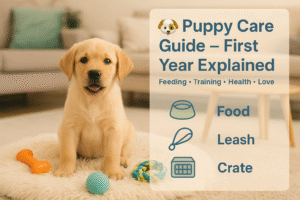Why Puppy Care Matters in the First Year
Welcoming a puppy into your home is exciting, but it’s also a big responsibility. The first 12 months are a critical stage in your puppy’s life. This is when their body grows rapidly, their personality develops, and their behavior habits form.
If you focus on proper puppy care during this stage, you’ll set the foundation for a healthy, well-behaved adult dog. Neglecting early care often leads to behavior problems, health issues, and a stressed relationship between you and your pet.
Quick Fact: According to the American Kennel Club (AKC), consistent care and training in the first year dramatically reduce behavior problems later in life.

How to Take Care of a Puppy – Step-by-Step Basics
Preparing Your Home for a New Puppy
Before your puppy comes home, make sure your house is safe. Puppies love to chew, explore, and test limits.
-
Remove toxic plants and cleaning supplies.
-
Secure electrical cords.
-
Block off unsafe areas.
-
Provide a cozy crate or bed.
👉 How to Pet-Proof Your Home Easily.
Setting Up a Safe Sleeping and Play Area
A crate or puppy playpen provides security and helps with house training. Puppies need their own quiet place to rest after playtime.
Puppy Feeding Basics – What and How Often to Feed
Feed a high-quality puppy food approved by your vet. Puppies need frequent, smaller meals compared to adult dogs:
-
8–12 weeks: 4 meals/day
-
3–6 months: 3 meals/day
-
6–12 months: 2 meals/day
👉 Safe and Unsafe Foods for Dogs and Cats.
Establishing a Daily Routine
Consistency is key. Puppies thrive on routine for feeding, bathroom breaks, play, and sleep.
Puppy Growth Stages Month by Month
8 Weeks – Bringing Your Puppy Home
-
First vaccinations completed.
-
Begin crate training and potty training.
-
Introduce gentle socialization.
3–6 Months – Teething & Training
-
Teething starts: chewing increases.
-
Teach basic commands (sit, stay, come).
-
Continue socialization with people and pets.
👉 Puppy Teething Timeline and Relief Tips.
6–9 Months – Adolescence
-
Energy levels peak.
-
Test boundaries with behavior.
-
Reinforce obedience and leash manners.
9–12 Months – Preparing for Adulthood
-
Growth slows, but training must continue.
-
Establish long-term feeding and exercise habits.
Health & Veterinary Care for Puppies
Puppy Vaccination Schedule Simplified
-
6–8 weeks: Distemper, Parvovirus
-
10–12 weeks: DHPP, Leptospirosis
-
12–16 weeks: Rabies, boosters
-
Yearly: Check-ups and vaccines
👉 Puppy Vaccination Schedule Simplified.
Deworming, Flea, and Tick Prevention
Regular deworming keeps puppies parasite-free. Use vet-approved flea and tick preventatives.
Regular Vet Checkups
Schedule visits every few months in the first year. Your vet will check growth, teeth, and overall health.
Signs of Common Puppy Health Issues
-
Lethargy
-
Persistent diarrhea or vomiting
-
Coughing or wheezing
-
Loss of appetite
👉 When to Take Your Dog to the Vet.
Training & Socialization Essentials
House Training and Crate Training Basics
Start potty training immediately. Take your puppy out after meals, naps, and playtime. Reward success with treats.
Teaching Obedience Commands
Focus on essential commands: sit, stay, come, down, and leave it.
👉 How to Teach a Dog to Sit Step by Step.
Socializing Puppies
Expose puppies to new sounds, people, and environments. Early socialization prevents fear-based behavior.
Handling Puppy Biting, Chewing, and Barking
Redirect chewing to toys. Discourage nipping hands by using positive reinforcement. Avoid punishment.
Puppy Nutrition & Feeding Guide
Choosing the Right Puppy Food
Look for AAFCO-approved puppy food. Consider breed size—large breed puppies need specific nutrition.
Feeding Schedules by Age
-
2–3 months: 4 meals
-
3–6 months: 3 meals
-
6–12 months: 2 meals
Safe and Unsafe Foods
-
✅ Safe: carrots, blueberries, apples (seedless)
-
❌ Unsafe: grapes, onions, chocolate, avocado
Puppy Treats and Rewards
Treats should be no more than 10% of daily calories. Use them for training, not constant snacking.
Daily Puppy Care & Lifestyle Tips
How Much Exercise Puppies Need
-
Small breeds: 30 minutes/day
-
Medium breeds: 45 minutes/day
-
Large breeds: 1+ hour/day
Grooming Routines for Puppies
Brush 2–3 times a week. Introduce baths, nail trimming, and ear cleaning early so your puppy gets used to it.
👉 (Internal link: Pet Grooming at Home: The Complete Guide).
How to Calm a Hyper Puppy at Night
-
Provide exercise before bedtime.
-
Keep a calm, dark environment.
-
Offer a comfort toy or crate cover.
Best Toys for Teething Puppies
Durable chew toys, frozen washcloths, and puppy-safe teething rings help with sore gums.
Common Puppy Care Mistakes to Avoid
-
Overfeeding leading to obesity.
-
Delaying training until bad habits form.
-
Missing vet visits.
-
Inconsistent rules at home.
Best Puppy Care Products for New Owners
-
Crate & Bed: A safe sleeping spot.
-
Food & Water Bowls: Stainless steel, non-slip.
-
Leash & Collar/Harness: Comfortable and secure.
-
Toys: For chewing, training, and play.
-
Grooming Kit: Brush, nail clippers, puppy shampoo.
👉 Best Pet Products in 2025: Beds, Toys, and Essentials.
Expert Tips & Recommendations for First-Time Puppy Parents
-
Be patient and consistent.
-
Balance training with affection.
-
Seek help from trainers or vets when needed.
-
Celebrate small milestones—progress takes time.
FAQs About Puppy Care for New Owners
Q1: How hard is it to take care of a puppy?
It requires time, patience, and consistency. With the right routine, puppy care becomes easier.
Q2: What do I need on the first day of bringing a puppy home?
Essentials include food, crate, bowls, leash, collar, toys, and puppy pads.
Q3: How long does it take to potty train a puppy?
On average, 4–6 months with consistent training.
Q4: How much sleep do puppies need?
Young puppies may sleep 18–20 hours a day.
Q5: When can puppies go outside safely?
After completing core vaccinations (around 16 weeks).
Conclusion – Raising a Happy, Healthy Puppy
Taking care of a puppy during the first year may feel overwhelming at first, but with proper guidance, it’s incredibly rewarding. From nutrition and training to health and play, each step shapes your dog’s future.
👉 For more puppy tips, explore our guides on Puppy Growth Stages and Puppy Vaccination Schedule.
Final Tip: Love, patience, and consistency are the real keys to raising a happy, well-behaved dog. 🐾

